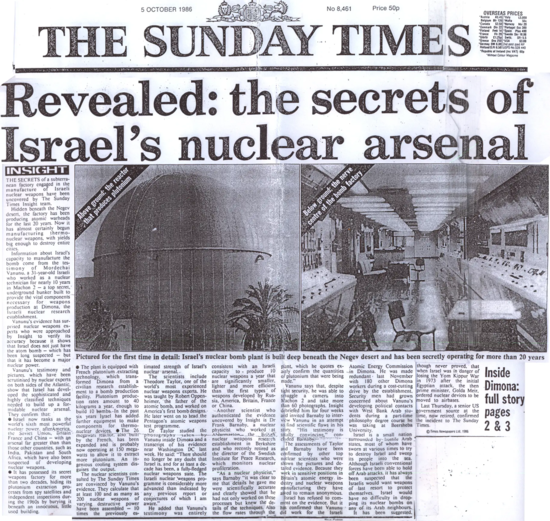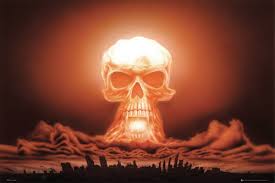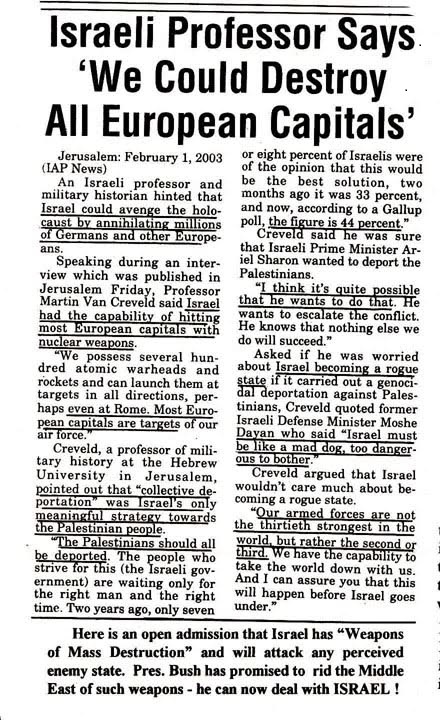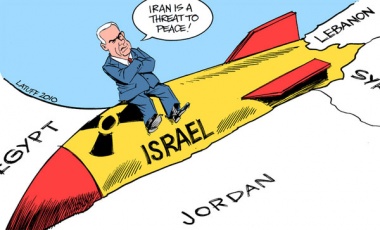Difference between revisions of "Israel/Nuclear Weapons"
(lede add on) |
|||
| (One intermediate revision by the same user not shown) | |||
| Line 6: | Line 6: | ||
|constitutes=Nuclear Weapons | |constitutes=Nuclear Weapons | ||
}} | }} | ||
| − | Israel refuses to admit officially that it has '''nuclear weapons''' - a policy known as "nuclear ambiguity" or "nuclear opacity".<ref>Avner Cohen, Israel and the Bomb, p. 1-3.</ref> This despite government officials inferring repeatedly - and occasionally admitting - the fact. | + | Israel refuses to admit officially that it has '''nuclear weapons''' - a policy known as "nuclear ambiguity" or "nuclear opacity".<ref>Avner Cohen, Israel and the Bomb, p. 1-3.</ref> This despite government officials inferring repeatedly - and occasionally admitting - the fact; like [[Benjamin Netanjahu]] in [[2020]] <ref>https://www.reuters.com/article/us-israel-netanyahu-nuclear/netanyahu-in-apparent-stumble-calls-israel-nuclear-power-idUSKBN1Z40CS/</ref> and [[Ehud Olmert]] in [[2006]].<ref>Then Israeli Prime Minister [[Ehud Olmert]] appeared to acknowledge that Israel had nuclear weapons when he stated on German TV that Iran was "aspiring to have nuclear weapons as America, France, Israel, Russia" - http://news.bbc.co.uk/2/hi/middle_east/6170845.stm - https://www.nytimes.com/2006/12/12/world/middleeast/12olmert.html - http://www.abc.net.au/am/content/2006/s1809421.htm </ref> In [[2024]] the United States indirectly confirmed the existence of Israel's nuclear weapons by acknoledging the authenticity of leaked intelligence documents, one of which stated that: "we have not observed any indications that Israel intends to use a nuclear weapon".<ref>https://t.me/Middle_East_Spectator/11183?single</ref><ref>https://t.me/Middle_East_Spectator/11184?single</ref><ref>https://edition.cnn.com/2024/10/19/politics/us-israel-iran-intelligence-documents/index.html</ref><ref>https://www.zerohedge.com/geopolitical/leaked-us-intel-confirms-israeli-nuclear-weapons</ref> |
| + | |||
| + | [[Mordechai Vanunu]] made Israel's stockpile public by smuggling photographs of [[nuclear weapons]] and production equipment out of the country in the [[1980s]].<ref>Peter Hounam, Woman From Mossad: The Torment of Mordechai Vanunu, Vision Paperbacks, 1999, pp. 155-168.</ref> Israel now may have as many as 400 atomic and hydrogen nuclear weapons,<ref>Harold Hough, "Could Israel’s Nuclear Assets Survive a First Strike?" Jane’s Intelligence Review, September, 1997, pp. 407-410.</ref><ref>"U.S. Air Force: Israel has 400 nukes, building naval force," World Tribune, July 4, 2002.</ref> as well as the ability to launch them via long range missiles, [[submarines]] and aircraft.<ref>Douglas Frantz, "Israel Adds Fuel to Nuclear Dispute, Officials confirm that the nation can now launch atomic weapons from land, sea and air," Los Angeles Times, Sunday, October 12, 2003.</ref> It can use them in a second strike even if its military is devastated. | ||
==Official policy and threats== | ==Official policy and threats== | ||
| Line 34: | Line 36: | ||
==Size of Israeli arsenal== | ==Size of Israeli arsenal== | ||
| − | In [[1997]], ''[[Jane's Intelligence Weekly]]'' analysed available images and information on [[Kfar Zechariah]], a supposed Israeli nuclear base, and concluded that it housed some 50 Jericho-2 missiles, believed to have a maximum range of about 3,000 miles with a warhead of about 2,200 pounds. The complex contained nuclear bombs configured for dropping from bombers in five bunkers holding 150 weapons. "This ... supports indications that the Israeli arsenal may contain as many as 400 nuclear weapons with a total combined yield of 50 megatons," the report concluded.<ref>[https://web.archive.org/web/20080117120058/http://archive.newsmax.com/archives/articles/2001/10/15/112430.shtml Samson Option: Israel's Plan to Prevent Mass Destruction Attacks] "the Israeli arsenal may contain as many as 400 nuclear weapons with a total combined yield of 50 megatons" Jane's Intelligence Weekly of 1997, cited by NewsMax Oct. 16, 2001.</ref> Other estimates speak 100 to 200 nuclear warheads.<ref>http://news.bbc.co.uk/2/hi/middle_east/7420573.stm</ref> | + | In [[1997]], ''[[Jane's Intelligence Weekly]]'' analysed available images and information on [[Kfar Zechariah]], a supposed Israeli nuclear base, and concluded that it housed some 50 Jericho-2 missiles, believed to have a maximum range of about 3,000 miles with a warhead of about 2,200 pounds. The complex contained nuclear bombs configured for dropping from bombers in five bunkers holding 150 weapons. "This ... supports indications that the Israeli arsenal may contain as many as 400 nuclear weapons with a total combined yield of 50 megatons," the report concluded.<ref>[https://web.archive.org/web/20080117120058/http://archive.newsmax.com/archives/articles/2001/10/15/112430.shtml Samson Option: Israel's Plan to Prevent Mass Destruction Attacks] "the Israeli arsenal may contain as many as 400 nuclear weapons with a total combined yield of 50 megatons" Jane's Intelligence Weekly of 1997, cited by NewsMax Oct. 16, 2001.</ref> Other estimates speak 100 to 200 nuclear warheads.<ref>http://news.bbc.co.uk/2/hi/middle_east/7420573.stm</ref> [[Seymour Hersh]] wrote in [[1991]] that [[Israel]] had developed [[suitcase nuclear bomb]]s during the [[1970s]].<ref>Seymour Hersh, The Samson Option, Page: 220</ref> |
==Samson Option== | ==Samson Option== | ||
Latest revision as of 07:16, 21 October 2024
(Nuclear Weapons) | |
|---|---|
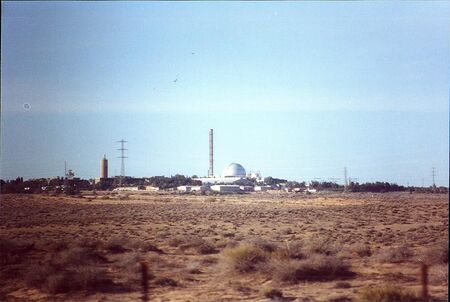 The Dimona Nuclear Research Center.[1] | |
| Interest of | Avner Cohen |
Israel refuses to admit officially that it has nuclear weapons - a policy known as "nuclear ambiguity" or "nuclear opacity".[2] This despite government officials inferring repeatedly - and occasionally admitting - the fact; like Benjamin Netanjahu in 2020 [3] and Ehud Olmert in 2006.[4] In 2024 the United States indirectly confirmed the existence of Israel's nuclear weapons by acknoledging the authenticity of leaked intelligence documents, one of which stated that: "we have not observed any indications that Israel intends to use a nuclear weapon".[5][6][7][8]
Mordechai Vanunu made Israel's stockpile public by smuggling photographs of nuclear weapons and production equipment out of the country in the 1980s.[9] Israel now may have as many as 400 atomic and hydrogen nuclear weapons,[10][11] as well as the ability to launch them via long range missiles, submarines and aircraft.[12] It can use them in a second strike even if its military is devastated.
Contents
Official policy and threats
During the 1960s Israel concentrated on conventional military superiority to defend lands confiscated in the 1948 and 1967 wars - and to convince Palestinians in Israel and the occupied territories that they could not break free of it. However, in 1973's Yom Kippur War Israel was almost overwhelmed by Arab forces. Prime Minister Golda Meir authorized a nuclear alert, ordering 13 atomic bombs be prepared for missiles and aircraft. Israeli Ambassador/U.S. Simha Dinitz threatened "very serious conclusions" if there was not an immediate airlift of supplies.[13][14][15] This forced U.S. President Richard Nixon to make emergency airlifts of state of the art military supplies to Israel.[16][17]
Fearing intervention by the Soviet Union, U.S. forces went on Defense Condition (DEFCON) III alert status,[18] something which could have led to full scale nuclear war in case of misinterpretation of signals or hardware or software failures. Additionally, as Seymour Hersh documents in detail in his book The Samson Option, from 1973 these weapons have been used to discourage the Soviet Union - now Russia - from intervening militarily on behalf of Arab nations.[19] Obviously an Israeli nuclear attack on Russia by the United States’ great ally Israel would result in Russia sending thousands of nuclear weapons towards the U.S. and the U.S. responding in kind.
Not surprisingly, no nation state has attempted to attack Israel since 1973. A former Israeli official justified Israel’s threats. "You Americans screwed us" in not supporting Israel in its 1956 war with Egypt. "We can still remember the smell of Auschwitz and Treblinka. Next time we’ll take all of you with us."[20] General Moshe Dayan, a leading promoter of Israel’s nuclear program,[21] has been quoted as saying "Israel must be like a mad dog, too dangerous to bother."[22] Amos Rubin, an economic adviser to former Prime Minister Yitzhak Shamir, said "If left to its own Israel will have no choice but to fall back on a riskier defense which will endanger itself and the world at large... To enable Israel to abstain from dependence on nuclear arms calls for $2 to 3 billion per year in U.S. aid."[23]
In 1977, after a right-wing coalition under Menachen Begin took power, the Israelis began to use the Samson Option not just to deter attack but to allow Israel to "redraw the political map of the Middle East" by expanding hundreds of thousands of Israeli settlers into the West Bank and Gaza.[24] Then-Minister of Defense Ariel Sharon said things like "We are much more important than (Americans) think. We can take the middle east with us whenever we go"[25] and "Arabs may have the oil, but we have the matches."[26] He proclaimed his - and many Likud Party members' - goals of transforming Jordan into a Palestinian state and "transferring" all Palestinian refugees there.[27][28] A practice known worldwide as "ethnic cleansing."
To dissuade the Soviet Union from interfering with its plans, Prime Minister Begin immediately "gave orders to target more Soviet cities" for potential nuclear attack. Its American spy Jonathan Pollard was caught stealing such nuclear targeting information from the U.S. military in 1985.[29]
During the next 25 years Israel became more militarily adventurous, bombing Iraq’s under-construction Osirak nuclear reactor in 1981, invading Lebanon to destroy Palestinian refugee camps in 1982 and to fight Hezbollah in 2006, massively bombing civilian targets in the West Bank Jenin refugee camp in 2002 and thoughout Gaza in 2008-2009. There are conflicting reports about whether Israel went on nuclear alert and armed missiles with nuclear weapons during the 1991 Gulf War after Iraq shot conventionally armed scud missiles into it.[30][31]
In 2002, while the United States was building for the 2003 invasion of Iraq, then Prime Minister Ariel Sharon threatened that if Israel was attacked "Israel will react. Is it clear?"[32] Israeli defense analyst Zeev Schiff explained: "Israel could respond with a nuclear retaliation that would eradicate Iraq as a country." It is believed President Bush gave Sharon the green-light to attack Baghdad in retaliation, including with nuclear weapons, but only if attacks came before the American military invasion.[33]
Former Israeli Foreign Minister Shimon Peres has admitted that nuclear weapons are used by Israel for "compellent purposes" - i.e., forcing others to accept Israeli political demands.[34] In 1998 Peres was quoted as saying, "We have built a nuclear option, not in order to have a Hiroshima, but to have an Oslo," referring to imposing a settlement on the Palestinians.[35]
In her book Israel’s Sacred Terrorism Livia Rokach documented how Israelis have used religion to justify paramilitary and state "terrorism" to create and maintain a Jewish State.[36] Two other Israeli retaliation strategies are the popularized phrase "Wrath of God," the alleged Israeli assassination of those it held responsible for the 1972 killings of Israeli athletes during the Munich Olympics,[37] and the "Dahiya doctrine" of destruction of civilian areas to punish Palestinians for supporting their leaders.[38]
Israeli Israel Shahak wrote in 1997: "Israel clearly prepares itself to seek overtly a hegemony over the entire Middle East...without hesitating to use for the purpose all means available, including nuclear ones."[39] Zeev Schiff opined in 1998 that "Off-the-cuff Israeli nuclear threats have become a problem."[40] In 2003 David Hirst noted that "The threatening of wild, irrational violence, in response to political pressure, has been an Israeli impulse from the very earliest days" and called Israel a candidate for "the role of 'nuclear-crazy' state."[41] Noam Chomsky said of the Samson Option "the craziness of the state is not because the people are insane. Once you pick a policy of choosing expansion over security, that's what you end up getting stuck with."[42] Efraim Karsh calls the Samson Option the "rationality of pretended irrationality," but warns that seeming too irrational could encourage other nations to attack Israel in their own defense.[43]
Funding and development
On April 14, 2015, Veterans Today published a story claiming that France provided uranium and a nuclear reactor to Israel, while Germany was the source of funding for the Israeli nuclear weapons development.[44]
Size of Israeli arsenal
In 1997, Jane's Intelligence Weekly analysed available images and information on Kfar Zechariah, a supposed Israeli nuclear base, and concluded that it housed some 50 Jericho-2 missiles, believed to have a maximum range of about 3,000 miles with a warhead of about 2,200 pounds. The complex contained nuclear bombs configured for dropping from bombers in five bunkers holding 150 weapons. "This ... supports indications that the Israeli arsenal may contain as many as 400 nuclear weapons with a total combined yield of 50 megatons," the report concluded.[45] Other estimates speak 100 to 200 nuclear warheads.[46] Seymour Hersh wrote in 1991 that Israel had developed suitcase nuclear bombs during the 1970s.[47]
Samson Option
The Samson Option is a phrase used to describe Israel’s strategy of massive nuclear retaliation against "enemy" nations should its existence as a Jewish state be jeopardized through military attack. Israeli leaders created the term in the mid-1960s, inspired by the Biblical figure Samson, who destroyed a Philistine temple, killing himself and thousands of Philistine enemies.[48][49]
Originally a strategy of last resort retaliation - even if it means Israel’s annihilation - it has developed into being a nuclear bullying strategy to further Israel’s territorial goals through threats and blackmail. Israel has bullied not only Arab and Muslim nations, but the United States and Russia with its Samson Option threats. Mordechai Vanunu has alleged that Israel uses for purposes of blackmail its ability to "bombard any city all over the world, and not only those in Europe but also those in the United States."[50]
Prominent Samson Option Supporters
Martin van Creveld, a professor of military history at the Hebrew University in Jerusalem, was quoted in 2003 giving explicit support of the Samson Option: "Most European capitals are targets for our air force ... we have the capability to take the world down with us. And I can assure you that that will happen before Israel goes under."[51]
David Perlmutter, Louisiana State University professor and supporter of Israel wrote in 2002 for the Los Angeles Times: "What would serve the Jew-hating world better in repayment for thousands of years of massacres but a Nuclear Winter. Or invite all those tut-tutting European statesmen and peace activists to join us in the ovens? For the first time in history, a people facing extermination while the world either cackles or looks away--unlike the Armenians, Tibetans, World War II European Jews or Rwandans--have the power to destroy the world. The ultimate justice?"[52]
Alan Hart interviewed Golda Meir for the BBC's Panorama programme in April 1971 and asked her "Prime Minister ... You are saying that if ever Israel was in danger of being defeated on the battlefield, it would be prepared to take the region and even the whole world down with it?". Hart continues that, "without the shortest of pauses for reflection, and in the gravel voice that could charm or intimidate American Presidents according to need, Golda replied 'Yes, that's exactly what I am saying'". Hart further claims that during the "early panic" of the 1973 (Yom Kippur) war, two Israeli missiles were armed with nuclear warheads and targeted on Cairo and Damascus.[53] It is known that the US rapidly re-armed Israel at that time.
The Israelis are encouraged in their nuclear threats by "Christian Zionists" like Hal Lindsay who believe Israel must expand its control of territory to its Biblical borders in order to bring about Armageddon and the return of Jesus Christ.[54] Some suspect that former President George W. Bush holds such beliefs[55] especially after his November 2007 statement "If you want to see World War Three, you know, a way to do that is to attack Israel with a nuclear weapon."[56]
Samson Option as a shield for conventional attack
Support for even more active use of the nuclear threat comes from Louis René Beres, a professor of Political Science at Purdue University and an Ariel Sharon advisor. He recommends Israel carry out conventional preemptive attacks against enemy nuclear and non-nuclear assets while using the nuclear threat to discourage conventional retaliation.[57] Jerome Corsi, a Harvard Ph.D. in political science and author of two books encouraging Israel to use nuclear weapons writes that "Israel's Samson Option" could be "a preemptive strike against Iran."[58]
Israeli Threats Against Iran
Israel’s threats to use nuclear weapons, including preemptively, have increased greatly since the revelation in 2002 that Iran was building uranium enrichment facilities. That year Prime Minister Ariel Sharon demanded that the international community target Iran as soon as it was finished dealing with Iraq.[59]
Unlike Israel, Iran has accepted supervision of its nuclear program under the Nuclear Nonproliferation Treaty. Iran claims its program is only for production of nuclear power as oil becomes more scarce and expensive, and not for nuclear weapons. However, Israel opposes any challenge to its nuclear hegemony since not only would it be less able to use its nuclear threat to keep confiscated lands, but fear of Iran actually might cause citizens to leave Israel and investment to dry up.[60][61] Israel also must worry about other "enemy" Arab nations which already are seeking or soon may seek nuclear energy.[62]
In 2004 Defense Minister Shaul Mofaz said that Israel would consider "all options" to prevent Iran from producing nuclear weapons.[63] Rumors and warnings of an impending Israeli attack on Iran’s facilities, including possibly with nuclear weapons, have circulated repeatedly since that time.[64][65]
Meanwhile, Israel still considers Russia a target because of its technical assistance to Iran’s nuclear program and its continued arms sales to Iran and other "enemy" nations.[66][67][68] In 2007 Israeli officials warned Russia: "We hope they understand that this is a threat that could come back to them as well."[69]
In 2005 George Bush admitted that the U.S. would support an Israeli attack on Iran.[70] Soon after his election President Barack Obama seemed to accept the inevitability of an Iranian nuclear bomb.[71] However, in early 2009 Likud Party hawk Benjamin Netanyahu was elected Israeli Prime Minister. Netanyahu already had threatened that Israel would attack Iran to stop its nuclear program if Obama did not do so.[72] Considering Iran’s threats to retaliate, this easily could lead to a "Samson Option" scenario.[73][74] After May[75] and September meetings with Netanyahu in 2009, Obama threatened Iran with attack if it did not "come clean about" and curb its nuclear program.[76][77] This statement came a day after Netanyahus’ speech to the United Nations where he invoked the memory of Auschwitz and family members slain by Nazis.[78] Obama also has suffered constant pressure to take a more belligerent stand against Iran from neoconservatives and the "Israel lobby."[79][80][81][82]
Too few peace or political activists, left or right, are willing to challenge Israel’s Samson Option threats or even to make a nuclear free Middle East a central demand.[83] Until military and political leaders, as well as activists, are willing to change U.S. policy of defacto support for Israel’s Samson Option the whole world remains a potential victim of this horrific strategy.
Wikipedia Origins and difficulties
An attempt was made to write an article of this form at the Wikipedia but it has less than 1/3rd of the number of references shown here. Editorial discussions on what can be accepted is here. Major excisions of likely relevant material can be seen here and here.
Related Documents
| Title | Type | Publication date | Author(s) | Description |
|---|---|---|---|---|
| Document:Israel Goes to Court for the Crime of Genocide | Article | 12 January 2024 | Philip Giraldi | The plan by America’s “best friend” and “closest ally” to nuke the world even has a name: the “Samson Option,” recalling how the Biblical strongman Samson brought down the temple where the Philistines were mocking him, killing thousands of them. |
| Document:Israel; Dark thoughts and Desperation | article | 7 April 2002 | David Perlmutter |
Resources
- Avner Cohen, "The Last Nuclear Moment" The New York Times, 6 October 2003.[1]
- Avner Cohen, Israel and the Bomb, Columbia University Press, 1998.[2] "This was a difficult book for Avner Cohen to write. As an Israeli, he had to break the code of silence that surrounds the discussion of nuclear weapons in his homeland. But he has done a superb job of laying out the political history of Israel's nuclear program from its foundation in 1950 through the acceptance by the United States of Israel as a nuclear-weapon state in 1970. Cohen has achieved the impossible. With Israel and the Bomb, he has written a scholarly treatise that includes over 1,200 footnotes, yet reads like a novel." --Lawrence Korb New York Times Book Review Nov. 1, 1998
- Avner Cohen, "Israel's Nuclear Opacity: a Political Genealogy," published in The Dynamics of Middle East Nuclear Proliferation edited by Steven L. Spiegel, Jennifer D. Kibbe and Elizabeth G. Matthews. Symposium Series, Volume 66, The Edwin Mellen Press, 2001.
- Jerome Corsi, Atomic Iran, Chapter: "The Samson Option, Israel's Preemptive Strike" WND Books, 2005
- Jerome Corsi, Why Israel Can't Wait: The Coming War Between Israel and Iran, Simon and Schuster, p. 101, 2009.
- Warner D. Farr, "The Third Temple's Holy of Holies: Israel's Nuclear Weapons." Counterproliferation Paper No. 2, USAF Counterproliferation Center, Air War College, September 1999.
- Mark Gaffney, Dimona, The Third Temple:The Story Behind the Vanunu Revelation, 1989, Amana Books.
- David Hirst, "The War Game, a controversial view of the current crisis in the Middle East," The Observer Guardian, September 21, 2003.
- Seymour Hersh, The Samson Option: Israel's Nuclear Arsenal and American Foreign Policy, Random House, 1991
References
- ↑ http://www.globalsecurity.org/wmd/world/israel/dimona.htm
- ↑ Avner Cohen, Israel and the Bomb, p. 1-3.
- ↑ https://www.reuters.com/article/us-israel-netanyahu-nuclear/netanyahu-in-apparent-stumble-calls-israel-nuclear-power-idUSKBN1Z40CS/
- ↑ Then Israeli Prime Minister Ehud Olmert appeared to acknowledge that Israel had nuclear weapons when he stated on German TV that Iran was "aspiring to have nuclear weapons as America, France, Israel, Russia" - http://news.bbc.co.uk/2/hi/middle_east/6170845.stm - https://www.nytimes.com/2006/12/12/world/middleeast/12olmert.html - http://www.abc.net.au/am/content/2006/s1809421.htm
- ↑ https://t.me/Middle_East_Spectator/11183?single
- ↑ https://t.me/Middle_East_Spectator/11184?single
- ↑ https://edition.cnn.com/2024/10/19/politics/us-israel-iran-intelligence-documents/index.html
- ↑ https://www.zerohedge.com/geopolitical/leaked-us-intel-confirms-israeli-nuclear-weapons
- ↑ Peter Hounam, Woman From Mossad: The Torment of Mordechai Vanunu, Vision Paperbacks, 1999, pp. 155-168.
- ↑ Harold Hough, "Could Israel’s Nuclear Assets Survive a First Strike?" Jane’s Intelligence Review, September, 1997, pp. 407-410.
- ↑ "U.S. Air Force: Israel has 400 nukes, building naval force," World Tribune, July 4, 2002.
- ↑ Douglas Frantz, "Israel Adds Fuel to Nuclear Dispute, Officials confirm that the nation can now launch atomic weapons from land, sea and air," Los Angeles Times, Sunday, October 12, 2003.
- ↑ Seymour Hersh, pp. 225-227.
- ↑ Avner Cohen, p. 236.
- ↑ Mark Gaffney p. 147.
- ↑ Warner D. Farr, "The Third Temple's Holy of Holies: Israel's Nuclear Weapons." Counterproliferation Paper No. 2, USAF Counterproliferation Center, Air War College, September 1999.
- ↑ Avner Cohen, "The Last Nuclear Moment,"
- ↑ Federation of American Scientists web page on DEFCON DEFense CONdition.
- ↑ Seymour Hersh, pp. 17, 40, 66, 174-75, 177, 216, 220, 223-231.
- ↑ Seymour Hersh, p. 42.
- ↑ Seymour Hersh, p. 174-180.
- ↑ David Hirst, "The War Game"
- ↑ Mark Gaffney, p. 153.
- ↑ Seymour Hersh, 259-261.
- ↑ Seymour Hersh, 289.
- ↑ Mark Gaffney, p. 165.
- ↑ Encyclopedia of Orient on Likud Party and Elfi Pallis, "The Likud Party: A Primer," Journal of Palestine Studies, Winter 1992.
- ↑ Seymour Hersh, pp. 288-289.
- ↑ Seymour Hersh, p. 260.
- ↑ Avigdor Haselkorn, The continuing storm: Iraq, poisonous weapons and deterrence, Yale University Press, 1999 131-135.
- ↑ David Eberhart, "Samson Option: Israel's Plan to Prevent Mass Destruction Attacks," NewsMax.Com, October 16, 2001.
- ↑ Stephen Farrell, Robert Thomson and Danielle Haas, "Attack Iran the day Iraq war ends, demands Israel," London Times, November 5, 2002.
- ↑ Ross Dunn, "Sharon eyes 'Samson option' against Iraq," Scotsmann, November 3, 2002.
- ↑ Mark Gaffney, p. 131
- ↑ Warner D. Farr online.
- ↑ Livia Rokach, Israel’s Sacred Terrorism, Third Edition, Association of Arab American University Graduates,1986.
- ↑ "Operation Wrath of God" article in Wikipedia.
- ↑ "The Dahiya strategy," including interview with IDF Northern Command Chief Gadi Eisenkot,Yedioth Ahronoth (Ynet News), June 10, 2008.
- ↑ Israel Shahak, Open Secrets: Israeli Nuclear and Foreign Policies, Pluto Press, 1997, p. 2.
- ↑ "United States Information Agency’s Foreign Media Reaction Report, Middle East section, February 4, 1998," reprinted at GlobalSecurity.org.
- ↑ David Hirst article.
- ↑ Transcript of Noam Chomsky talk: "Assessing the Role of US Foreign Policy, Israeli Security, & Human Rights in the Occupied Palestinian Territories," April 7, 2009 Madison, WI. Youtube Video of talk.
- ↑ Efraim Karsh, Between war and peace: dilemmas of Israeli security, Routledge, 1996 pp.130-131.
- ↑ http://www.veteranstoday.com/2015/04/14/caught-germany-bought-israels-nukes/
- ↑ Samson Option: Israel's Plan to Prevent Mass Destruction Attacks "the Israeli arsenal may contain as many as 400 nuclear weapons with a total combined yield of 50 megatons" Jane's Intelligence Weekly of 1997, cited by NewsMax Oct. 16, 2001.
- ↑ http://news.bbc.co.uk/2/hi/middle_east/7420573.stm
- ↑ Seymour Hersh, The Samson Option, Page: 220
- ↑ Hersh, The Samson Option pp. 42, 136-137, 288-289.
- ↑ Avner Cohen, Israel and the Bomb pp. 2, 7, 341 and Avner Cohen, "Israel's Nuclear Opacity: a Political Genealogy," pp. 187-212.
- ↑ "Vanunu Confirms Israel's Global Thermonuclear Blackmail," An Interview With Hesham Tillawi, PhD, December 19, 2009.
- ↑ David Hirst article.
- ↑ David Perlmutter, Opinion Page piece "Israel: Dark Thoughts and Quiet Desperation," Los Angeles Times, April 7, 2002.
- ↑ Zionism The Real Enemy of the Jews volume 2, Alan Hart, 2005. Golda Meir, interview with author for BBC's Panorama programme, April 1971.
- ↑ Hal Lindsay on the Samson Option: The Samson Option, July 14, 2007 at StandingWithIsrael.org and "Prophesied destruction of Damascus imminent?", WorldNetDaily.Com, September 21, 2007.
- ↑ Michael Ortiz Hill, "Mine Eyes Have Seen the Glory: Bush's Armageddon Obsession, Revisited," Counterpunch.org, January 4, 2003.
- ↑ "Bush defends World War Three comments on Iran," Reuters, Nov 7, 2007.
- ↑ Louis Rene Beres, "Israel and Samson. Biblical Insights on Israeli Strategy in the Nuclear Age," March 22, 2004; Beres, et al. Project Daniel final report; "The world, of course, continues to begrudge the Jewish state: Israel and Palestine, the Samson Option" Canada Free Press, March 31, 2009.
- ↑ Corsi, Atomic Iran.
- ↑ Stephen Farrell, Robert Thomson and Danielle Haas, "Attack Iran the day Iraq war ends, demands Israel," London Times, November 5, 2002.
- ↑ Roger Howard, "Why Israel Really Fears Iranian Nukes," Antiwar.com, November 27, 2004.
- ↑ "Nuclear Shadow over the Middle East," PalestineChronicle, May 11, 2009.
- ↑ Stuart Reigeluth, "Race to ultimate arms," Weekly Ahram.org, 14-20 August 2008, Issue No. 910.
- ↑ "Israel Takes Issue With Iran Weapons," Yahoo News, September 29, 2004.
- ↑ "Israeli Defence Minister Calls For Calm Over Rumoured Attack On Iran Jerusalem," Agence-France Presse, December 22, 2004.
- ↑ Jason Ditz, "Israel Preparing to Attack Iran Without US Assistance," Antiwar.com, December 4, 2008.
- ↑ Alan Sabrosky, "Bibi Netanyahu: a Knave of Ghosts and Shadows," Salem-News.com, October 5, 2009.
- ↑ Michael Jasinski, "Russia's Nuclear and Missile Technology Assistance to Iran; Nasser Karimi, Russian Fuel Ready for Iran," Associated Press, September 16, 2007 and Robert Tait, Mark Tran, "Putin warns US against military action on Iran," The Guardian, October 16, 2007.
- ↑ Herb Keinon, "Jerusalem sees Russian interests behind arms sales to Damascus," The Jerusalem Post, August 20, 2007
- ↑ Yaakov Katz and Herb Keinon, "Israel warns Russia on Iran arms sale," Jerusalem Post, January 16, 2007.
- ↑ Francis Harris, "America would back Israel attack on Iran," The Telegraph February 18, 2005.
- ↑ Aluf Benn, "Obama's atomic umbrella: U.S. nuclear strike if Iran nukes Israel," Haaretz, November 12, 2008.
- ↑ Jeffrey Goldberg, "Netanyahu to Obama: Stop Iran - Or I Will," The Atlantic, March 31, 2009.
- ↑ Michael Theodoulou, "Iran threatens to set Israel ablaze as fears grow of US-backed war," Scotsman, July 9, 2008.
- ↑ "Iran threatens to strike Israel's nuclear sites if attacked," Daily Star, December 10, 2009.
- ↑ Jason Ditz, "Obama Emphasizes Iran ‘Threat’ on Eve of Netanyahu Visit," Antiwar.com, May 17, 2009.
- ↑ Jason Ditz, "Netanyahu Leads Calls for Harsh Moves Against Iran," Antiwar.com, September 24, 2009.
- ↑ Jason Ditz, "Obama: Iran Is on Notice, Won’t Rule Out Military Action," Antiwar.com, September 25, 2009.
- ↑ Text of Netanyahu speech before the United Nations, September 24, 2009.
- ↑ Stephen J. Sniegoski, "Obama and the Neocon Middle East War Agenda," Antiwar.com, March 21, 2009.
- ↑ Daniel Luban, "Under Pressure from Hawks, Obama Tacks to the Right," Inter Press Service, August 12, 2009.
- ↑ Robert Parry, "Is Joe Lieberman Protecting Israel?" originally published in ConsortiumNews.com, December 15, 2009.
- ↑ Stephen M. Walt, "On Afghanistan, Iraq, and the Lobby: A response to Peter Beinart," ForeignPolicy.com, December 9, 2009.
- ↑ John Steinbach, "Israeli Weapons of Mass Destruction, A Threat to Peace: Israel's Nuclear Arsenal," GlobalResearch.Ca, March 2002.
